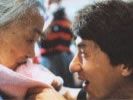Eye For Film >> Movies >> Traces Of A Dragon: Jackie Chan And His Lost Family (2002) Film Review
At one level, the Jackie Chan story is well known. Born in 1954 to immigrant parents, so poor they wondered how they could keep him, he spent most of his childhood indentured to Sifu Yu's Peking Opera school. Along with classmates, such as Samo Hung and Yuen Biao, he drifted into movies with the decline of the (seven little) fortunes of the opera. After a string of lacklustre films, in which he was unsuccessfully promoted as the next Bruce Lee, finally he found his metier as Lee's antithesis ("He kick high, I kick low") and established himself as one of the world's biggest stars, ultimately breaking into the US market in the mid-Nineties.
What has not been told, until now, is the back story of Chan's parents. With his mother ill, Jackie's father decided it was time to come clean. Mabel Cheung's film documents these revelations.

Chan had always believed he was an only child. This was not so. He had two half-brothers and two half-sisters, all of whom remained on the mainland when his parents left for Hong Kong. With the Sino-Japanese and civil wars as a backdrop, both certainly led colourful lives. Chan's father worked as an agent for the Nationalists and was forced to flee the country, leaving his sons and real surname - Fang - behind after the Communist victory in 1949. He first met Chan's mother when arresting her as an opium smuggler, the young woman having turned to crime to support her two daughters, following her husband's death in a Japanese raid.
As a loving tribute by Chan to his parents - his mother has since died - Traces Of A Dragon works well. Otherwise, it is less successful.
The narrative is difficult to follow at times and, in spite of extensive use of anonymous stock footage of war, turmoil, revolution and upheaval, the filmmakers are never quite able to satisfactorily connect the specific - the Chan family history - to the general - the 20th century Chinese experience, particularly that of the diasporan population - in the manner that they would like.
Jackie's reluctance to involve his own wife and child in the story, while understandable - an obsessed Japanese fan committed suicide on learning he was married - also impacts negatively on the film, making its discussions of the family history somewhat partial and lop-sided.
Entertainment-wise, it's a case of the earthy exuberance of Chan's father being counterbalanced by the graphic nature of some of the historical footage. Chan fans will lap it up, however, but those seeking broader insights into Chinese history may want to look elsewhere.
Reviewed on: 02 Aug 2003

















